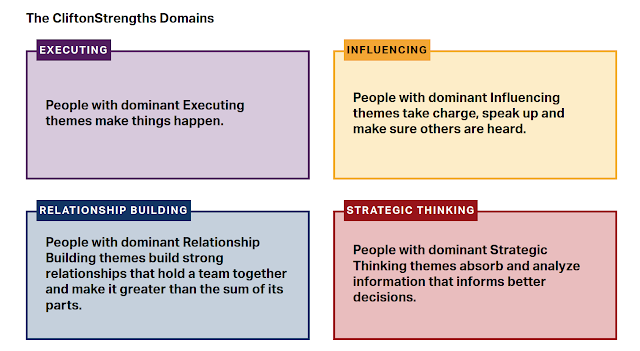"Everybody has their strengths and we can't have everybody else's strengths. It's just not the way it works. We bring our own stuff to the table." - Mandy Froehlich "5 Ways to Achieve Balance"
Singapore American School is a strengths school. Faculty take the Gallup's CliftonStrengths assessment during the on-boarding process. We then have strengths conversations with Strengths Communicators and or Strengths Leads.
 |
| Domains of strengths are color coded. |
I signed up for strengths communicator training this fall. There are several sessions over the course of the year. We read about our strengths. We have conversations with at other people about their strength. We share two of our eight conversations, meet with our strengths mentor, provide evidence of our training conversations, and then we are added to the list of communicators at the school.
Build a cadre of committed people and it will impact school culture and climate.
Gallup's sample size is ginormous. They've surveyed more than twenty-million folks at this point in time. They have data levels that rival Dante's Divine Comedy. And it is fascinating.
I wonder a lot about it. I wonder if Gallup has researched what happens when people take the strengths assessment multiple times or at different stages of their lives or careers. I wonder in Gallup has researched any factors that influence strengths outcomes. I wonder how the four domains of strengths were created.
 |
| 3 of my top 5 fall in the strat |
I know I could dig into some research. I do love a good rabbit trail. I just haven't done it yet. I like thinking and wondering about it though. Some might say that is because of my executing (achiever) or strategic thinking strengths (futuristic, learner, strategic).
I appreciate using the strengths as a lens. As someone in a recent session said, they help to depersonalize potential conflict or to detach from reactions or initial feelings. For instance, "one reason you may feel that way, is because it is in your ___ nature. As someone who is ____ you have a need to ___ or feel that ___." Or to be more specific, "of course you feel skeptical about a mandate from the district especially because of your strength as a learner. While you enjoy and are strong when it comes to exposure to new information and experiences, you need the experience of learning for yourself and a perceived mandate sounds to you sometimes like a "know it all" is giving orders.
Everyone on campus knows their strengths. Most people on our campus fall into two camps in terms of their strengths beliefs: embracers and eye-rollers. Do I buy in 110%? Do I swallow the hook with the "Cosmo quiz" or psycho-analytic feel of the bait? I see real value in using the strengths as a lens for how we work individually and on teams. I also appreciate analyzing conflict from a strengths lens.
Ultimately, in terms of value, I keep thinking back to Gallup's (N)--the sample size. It's a ginormous. And much of what surfaced in my own strengths assessment rings true. Could be confirmation bias or could be true. Perhaps it would change if I assessed again. I can't help but think about Gail Sheehy's Passages and New Passages. We change over time. Change is our only constant, right?
Still, Gallup onto something here. Something beyond consulting dollars and products for the capitalist market they serve. Something that seems statistically and perhaps personally significant.


Ah...I love a great strengths wondering! I took the assessment again after 4 years and 4 of my 5 remained the same. There are statistics about how the accuracy decreases with each attempt. #rabbithole
ReplyDelete